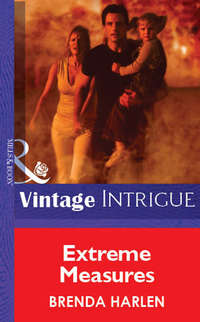
Полная версия
The New Girl In Town

The New Girl in Town
Brenda Harlen

www.millsandboon.co.uk
This book is dedicated to everyone
who has fought the fight against breast cancer with
courage and strength—you are an inspiration.
And to the memory of those who ultimately
lost the battle—you are not forgotten.
With thanks to the researchers,
doctors and other health-care professionals
who offer direction and hope.
Contents
Chapter One
Chapter Two
Chapter Three
Chapter Four
Chapter Five
Chapter Six
Chapter Seven
Chapter Eight
Chapter Nine
Chapter Ten
Chapter Eleven
Chapter Twelve
Chapter Thirteen
Epilogue
Chapter One
Zoe Kozlowski definitely wasn’t in Manhattan anymore.
Years of living in the city had acclimated her to the sounds of traffic—the squeal of tires, the blare of horns, the scream of sirens. She would no doubt have slept through the pounding of a jackhammer six stories below her open bedroom window or the wail of a fire truck speeding past her apartment building, but the gentle trilling of sparrows shattered the cocoon of her slumber.
In time, she was certain she would get used to these sounds, too, but for now, they were new and enchanting enough that she didn’t mind being awakened at such an early hour. As she carried her cup of decaf chai tea out onto the back porch, she could hear not just the birds but the gentle breeze rustling the leaves and, in the distance, the barking of a dog.
She stepped over a broken board and settled onto the top step to survey her surroundings in the morning light. The colors were so vivid and bright it almost hurt to look at them—the brilliantly polished sapphire of the sky broken only by the occasional fluffy white cloud. And the trees—there were so many kinds, so many shades of green around the perimeter of the yard. Evergreens whose sweeping branches ranged in hue from deep emerald to silvery sage. Oaks and maples and poplars with leaves of various shapes and sizes and colors of yellow-green and dark green and every tone in between.
She found herself wondering how it would look in the fall—what glorious shades of gold and orange and rust and red would appear. And then in the winter, when the leaves had fallen to the ground and the trees were bare, the long branches glistening with frost or dusted with snow. And in the early spring, when the first buds began to unfurl and herald the arrival of the new season.
But now, edging toward the first days of summer, everything was green and fresh and beautiful. And while she appreciated the natural beauty of the present, she was already anticipating the changing of the seasons. Not wishing her life away, but looking to her future here and planning to enjoy every minute of it.
She knew the yard was in as serious need of work as the old house in which she’d spent the night, but as she took another look around, she was filled with a deep sense of peace and satisfaction that everything she saw was hers.
She’d get a porch swing, she decided suddenly, impulsively. Where she could sit to enjoy her first cup of tea every morning. She would put down roots here, just like those trees, dig deep into the soil and make this place her home.
It was strange that she’d lived in New York for almost ten years and never felt the same compelling need to put down roots there. Or maybe it just hadn’t occurred to her to do so in a city made up of mostly concrete and steel. Not that she hadn’t loved Manhattan. There was an aura about the city that still appealed to her, an excitement she’d never felt anywhere else. For a young photographer, it had been the place to be, and when Scott had suggested moving there after they were married, she’d jumped at the opportunity. They’d started out at a tiny little studio apartment in Brooklyn Heights, moved to a one-bedroom walk-up in Soho, then, finally, only four years ago, to a classic six on Park Avenue.
She’d never imagined leaving there, never imagined wanting to be anywhere else. Until a routine doctor’s appointment had turned out to be not-so-routine after all.
In the eighteen months that had passed since then, her life had taken a lot of unexpected turns. The most recent of which had brought her here, to Pinehurst, New York, to visit her friend Claire and—
Oomph!
The breath rushed out of her lungs and her mug went flying from her fingers as she was knocked onto her back by a furry beast that settled on her chest.
She would have gasped if she’d had any air left to expel. Instead, she struggled to draw in enough oxygen to scream. As she opened her mouth, a big wet tongue swept over her face.
Ugh!
She wasn’t sure if the hairy creature was licking her in a harmless show of affection or sampling her before it sank its teeth in. She sputtered and tried to push it away.
A shrill whistle sounded in the distance and the dog—at least, she thought it was a dog, although it didn’t look like any kind she’d ever seen before—lifted its head in response to the sound. Then the tongue was back, slobbering over her again.
“Rosie!”
The animal withdrew, just far enough to plant its substantial behind on top of her thighs, trapping them beneath its impressive weight.
Zoe eyed it warily as she pushed herself up onto her elbows, bracing herself for another attack. A movement at the edge of the woods caught her attention, and she turned her head to see a tall, broad-shouldered figure moving with long-legged strides across the yard.
She shoved at the beast again, ineffectually, and blew out a frustrated breath. “Can you get this darn thing off me?” she asked through gritted teeth.
“Sorry.” The man reached down to grab the animal by its collar. Zoe’s irritation was forgotten as her gaze swept over her rescuer.
His hair was dark, almost black, and cut short around a face that seemed to be chiseled out of granite. His forehead was broad, his cheekbones sharp, and his nose had a slight bump on the bridge as if it had been broken once or twice before. His jaw was dark with stubble, and his eyes—she couldn’t be sure of the color because his face was in shadow, but she could tell that they were dark—were narrowed on the beast. He wore an old Cornell University T-shirt over a pair of jeans that molded to the lean muscles of his long legs and a scuffed pair of sneakers.
“Are you alright?” he asked, his voice as warm and smooth as premium-aged whiskey.
“I’m fine. Or I will be when you get this thing away from me.”
“Rosie, off.” He spoke to her attacker now, the words accompanied by a sharp tug on the collar. The four-legged beast immediately removed its weight from her legs and plopped down on its butt beside the man, tongue hanging out of its mouth as it gazed at him adoringly.
Zoe figured the beast was female. She also figured the man was used to that kind of reaction from the women he met. She might have been inclined to drool herself except that a half-dozen years as a fashion photographer had immunized her against the impact of beautiful faces. Well, mostly, anyway. Because she couldn’t deny there was something about this man’s rugged good looks she found appealing enough to almost wish she had her camera in hand.
The unexpectedness of that urge was something she would think about later, Zoe decided as she pulled herself to her feet, then rubbed a hand over her face to wipe away the dog drool. She tugged at the frayed hem of the cut-off shorts she’d pulled on when she’d rolled out of bed, conscious of the fact that they fell only a couple of inches below the curve of her butt.
“What the heck is that thing?” she asked, taking a deliberate step back from man and beast.
“He’s a dog,” the man responded in the same whiskey-smooth tone. “And although he’s overly affectionate at times, he doesn’t usually take to strangers.”
“Obviously it’s a dog.” At least it had four paws and wagging tail. “But what kind? I’ve never seen anything so—” ugly was the description that immediately came to mind, but she didn’t want to insult the man or his best friend, so she decided upon “—big.”
His smile was wry. “He’s of indeterminate pedigree—part deerhound, part Old English sheepdog, with a lot of other parts mixed in.”
She glanced at the handsome stranger again, saw that he was giving her the same critical study she’d given his pet. She was suddenly aware that her hair needed to be combed, her teeth needed to be brushed and her T-shirt was covered in muddy paw prints. Then his gaze lifted to hers, and she forgot everything else in the realization that his eyes were as startlingly blue as the sapphire sky overhead.
“Did you ever consider putting your dog in obedience classes?” she asked. “Preferably before it—he—knocks somebody unconscious.”
“As a matter of fact, Rosie graduated top of his class. He can heel, sit, lay down, roll over and speak.” He shrugged and smiled again. “He just hasn’t learned to curb his enthusiasm.”
“No kidding,” she said dryly. Then she frowned. “Did you call him ‘Rosie’?”
“It’s short for Rosencrantz.”
“Rosencrantz,” Zoe echoed, wondering what kind of person would inflict such torture on a helpless animal. Not that this one was helpless, but the name still seemed cruel.
“As in Rosencrantz and Guildenstern,” he told her. “From Hamlet.”
She was admittedly surprised—and more intrigued than she wanted to be by this sexy, blue-eyed, Shakespeare-reading stranger.
“Where is Guildenstern?” she asked apprehensively.
“With my brother,” the man answered. “My business partner found the two puppies abandoned by the creek in his backyard. He and his wife wanted to keep them, but they already have a cat and a baby on the way, so I got one and my brother took the other.”
She noticed that he spoke of his partner having a wife but didn’t mention one of his own. Not that it really mattered, of course. She had a lot of reasons for moving to Pinehurst, but looking for romance was definitely not one of them—especially when the wounds of her failed marriage had barely begun to heal.
“Well, you need to keep that thing on a leash,” she said, forcing her thoughts to refocus on the conversation.
The animal in question immediately dropped to its belly and whined plaintively.
Zoe frowned. “What’s wrong with him?”
“You said the L-word,” he told her.
She looked at him blankly.
“L-E-A-S-H.”
“You’ve got to be kidding.”
He shook his head. “Rosie hates being tied up.”
“Well, he’ll have to get used to it because I don’t appreciate being attacked in my own yard by your mongrel pet.”
“Your yard?” He seemed surprised by her statement. “You bought this place?”
She nodded.
“Are you rich and bored? Or just plain crazy?”
She bristled at that. “You’re not the first person to question my sanity,” she admitted. “But you’re the first who’s had the nerve to do so while standing on my property.”
“I’m just…surprised,” he said. “The house has been on the market a long time, and I hadn’t heard anything around town recently about a potential buyer.”
“The final papers were signed yesterday. This is my house, my land, my space.”
“If this is your house, your land, and your space, then that would mean—”
He paused to smile, and she cursed her traitorous heart for beating faster.
“—you’re my neighbor.”
Mason watched as her pale cheeks flushed with color, making him think she might be attractive if she cleaned herself up. Right now, however, she was a mess. Her long blond hair was tangled around her face, her brow—above incredibly gorgeous eyes the color of dark chocolate—was creased with a scowl, and her skimpy little T-shirt was covered in mud. But he couldn’t help but notice that the shirt clung to curves that looked soft and round in all the right places, and he felt the stir of arousal.
He gave himself a mental shake, acknowledging that he’d definitely been too long without a woman if the sight of this disheveled little spitfire was turning him on.
His current hiatus from dating had been a matter of choice as much as necessity, since his break-up with Erica had coincided with a flurry of big jobs that had required all of his attention and focus. Recently, however, things at the office had started to slow down a little. Enough at least that he could catch a decent amount of sleep at night and maybe even consider getting out socially again. If he did, maybe he’d meet a woman who was more his usual type.
But it was this woman who had his attention now. Because she was, if not his type, at least his neighbor, which made him naturally curious about her.
“Tell me something,” he said.
“What’s that?” she asked warily.
“What possessed a city girl like you to buy an abandoned old house like this?”
“What makes you think I’m a city girl?”
He allowed his gaze to move over her again, lingering, appraising. “The designer clothes and fancy watch, for starters. But mostly it’s the casual self-confidence layered over restless energy that says to hell with the rest of the world and somehow fits you as perfectly as those snug little denim shorts.”
She tilted her chin. “That’s quite an assumption to make after a five-minute conversation.”
He smiled. “I enjoy studying people—and women are a particular interest of mine.”
“I don’t doubt that’s true,” she said dryly.
He wasn’t dissuaded by the comment or her tone. “You never did answer my question about why you bought this house.”
“It’s a beautiful house.”
“It might have been a dozen years ago,” he allowed. “Before Mrs. Hadfield got too old and too tight-fisted to pay for the repairs.”
“What happened to Mrs. Hadfield?” she asked, in what seemed to him a blatant attempt to change the subject.
“She passed away about eighteen months ago, left the house to a grandson who lives in California. He put it on the market right away, but there was only one early offer on the property and he refused to sell to a developer, insisting his grandmother wouldn’t have wanted the house torn down and the land divided.”
After that deal had fallen through, Mason had learned from the real estate agent that the grandson had some specific ideas about the type of person Beatrice Hadfield wanted living in her house after she was gone. But he’d refused to elaborate on the criteria, even to the agent, and she’d mostly given up on selling the house—until now, apparently.
“And you know about this unsuccessful sale because…” she prompted.
“Because there are no secrets in a small town.”
“Great,” she muttered. “And I hated feeling like my neighbors were on top of me in the city.”
She really wasn’t his type, but she was female and kind of cute, and he couldn’t resist teasing, “I’ll only be on top if that’s where you want me, darlin’.”
Her chocolate eyes narrowed as she drew herself up to her full height—which was about a foot shorter than his six feet two inches. “It won’t be,” she said coolly. “And don’t call me ‘darling.’”
He held up his hands in mock surrender. “I didn’t mean to offend you…” He paused, giving her the chance to offer her name.
“My name is Zoe,” she finally told him. “Zoe Kozlowski.”
It was an unusual name but pretty, and somehow it suited her. “Mason Sullivan.”
She eyed his outstretched hand for a moment before shaking it.
Rosie barked and held up a paw.
His new neighbor glanced down, the hint of a smile tugging at the corners of her mouth. He found himself staring at that mouth, wondering if her lips were as soft and kissable as they looked.
Way too long without a woman.
“You didn’t tell me he could shake,” she said, removing her hand from his to take the paw Rosie offered.
“Another of his many talents,” he said, oddly perturbed that she seemed more interested in his dog than in him. Not that he was interested in her, but he did have a reputation in town for his success with the ladies, and never before had one thrown him over for an animal.
“Now if only you could teach him to respect the boundary line between our properties.”
“That might take some time,” he warned, as she released Rosie’s paw and straightened again. “He’s become accustomed to running through these woods over the past several months.”
“It won’t take any time at all if you keep him tied up,” she said.
Rosie whimpered as though he understood the threat, compelling Mason to protest on the animal’s behalf.
“He’s a free spirit,” he said, then smiled. “Like me.”
She tilted her head, studying him like she would a worrisome crack in a basement foundation. “Do the women in this town actually fall for such tired lines?”
It was an effort to keep the smile in place, but he wouldn’t give her the satisfaction of letting it fade. “I haven’t had any complaints.”
“I worked at Images in New York City for six years,” she said, citing one of the industry’s leading fashion magazines. “I spent most of my days surrounded by men who made their living playing a part for the camera, so it’s going to take more than a smile to make me melt.”
Okay, so she was tougher than he’d expected. But he hadn’t yet met a woman who was immune to his charm—it was only a matter of finding the right buttons to push. “That sounds like a challenge.”
“Just a statement of fact,” she told him, bending to pick up a mug that he guessed Rosie had knocked from her hand with the exuberance of his greeting. “Now if you’ll excuse me, I have things to do today.”
He stepped down off the porch, his hand still holding onto the dog’s collar, his eyes still on his new neighbor. “It was nice meeting you, Zoe.”
“It was certainly interesting,” she said, but with a half smile that allowed him to hope she wasn’t still annoyed at Rosie’s manner of introduction.
And as he turned toward his own home, he found himself already looking forward to his next encounter with his new neighbor.
Zoe walked into the house with a smile on her face and a positive outlook for the day despite—or maybe because of—the unexpected events of the morning. Though she couldn’t have anticipated meeting one of her neighbors in the backyard, and so early, she thought she’d handled the situation. She’d even managed to engage in a casual conversation without worrying too much about where he was looking or what he was thinking. It was a gloriously liberating experience.
Mason Sullivan was a stranger who knew nothing of her or her past, a dog owner simply apologizing for the affectionate nature of his pet. He was a man who’d looked at her like she was a woman—a completely normal interaction that followed a year and a half of wondering if anything would ever seem normal again.
In the past eighteen months, she’d lost everything that mattered: her husband, her job, her home, and—most devastating of all—her sense of self. She’d packed most of what she had left into a tiny storage unit, loaded a dozen boxes in the back of her car, then driven out of the city, determined to start her life over again somewhere new. What she really wanted was to go someplace where no one knew who she was, where no one would look at her with pitying glances or talk to her in sympathetic murmurs. Someplace where she could pretend she was still the woman she used to be.
What she’d found—on a visit to Claire, her best friend and confidante—was a charming Victorian house that caught her attention so completely she actually stopped her car right in the middle of the road to stare.
It was an impressive three stories of turrets and towers despite having been badly neglected and in desperate need of repair. The roof on the wraparound porch was sagging, the chimneys were crumbling, paint was peeling, and several of the windows were boarded up.
As Zoe studied the broken parts of the whole, she had to fight back tears. There was no doubt the house had once been strong and proud and beautiful. Now it was little more than a shadow of its former self—abandoned, neglected and alone.
Just as she was.
She almost didn’t see the For Sale sign that was mostly hidden by the weeds that had taken over the front garden, but when she did, she knew that it was meant to be hers. She’d pulled her car off the road and into a gravel driveway as overgrown with weeds as the yard, then picked up her cell phone and dialed the number on the sign.
For the past year and a half, she’d been looking for some direction and purpose, and here, at last, she’d found it.
Or maybe she really was crazy.
She acknowledged that possibility as she set her mug in the sink. But even if she was, she was committed now. The house was hers—along with the weighty mortgage she’d secured for the purchase and improvements. And though there was a part of her that was terrified to think she’d made a huge mistake, another—bigger—part of her was excited by the challenges and opportunities that lay ahead.
She was going to fix up this broken-down house and turn it into a successful bed-and-breakfast. Although there were several such establishments already in town, none were as majestic as the building that was now her home. Or as majestic as she knew it would be when she was finished with it.
She glanced at her watch, noted that it was almost eight o’clock. The architect—who happened to be the husband of the lawyer who’d helped her purchase the property—was due to arrive in a little more than half an hour.
She was excited about meeting him, anxious to get started. But she also felt the first niggle of doubt, a twinge of uncertainty. It was one thing to spin elaborate dreams inside her mind, and something else entirely to share these hopes with someone who could help her realize them—or destroy them.
As she made her way across the dusty floor, questions and doubts dogged her every step.
What was she doing?
It was what her friends and colleagues had asked when she’d walked away from her job at the magazine. They’d expressed sympathy for what she’d been through but on the whole agreed that the best thing for Zoe was to maintain the status quo as much as possible. She thought it ironic—and more than a little irritating—that so many people who hadn’t been through what she had could have so much advice about how to cope.
It was only Claire who really understood. And it was Claire who agreed Zoe should live the life she wanted to live rather than the one she had; Claire who knew that sometimes a person needed a new beginning in order to continue. And Claire had been thrilled when her friend had chosen Pinehurst for that fresh start. Admittedly, her excitement had been tempered by apprehension when she’d seen the house Zoe intended to buy, but her support had never wavered.
As Zoe batted away a cobweb, she wondered what her former colleagues in Manhattan would think now. Then she shook her head, refusing to let her mind continue along that path. She didn’t have time for doubts or recriminations—she needed to get ready for her appointment with the architect.
The taps creaked and the pipes groaned, but Zoe managed to coax water out of the shower head in the main-floor bathroom. It wasn’t very warm or clear, but it was enough to wet a washcloth to scrub over her face and her body. Trying to rinse the shampoo out of her hair was a different story, and she wondered if she should have spent the money on a motel room last night—at least then she could have had a hot shower with good water pressure. But she knew the renovations on the house would be costly, and what was left in her bank account after medical expenses and the down payment wasn’t exactly extravagant.








